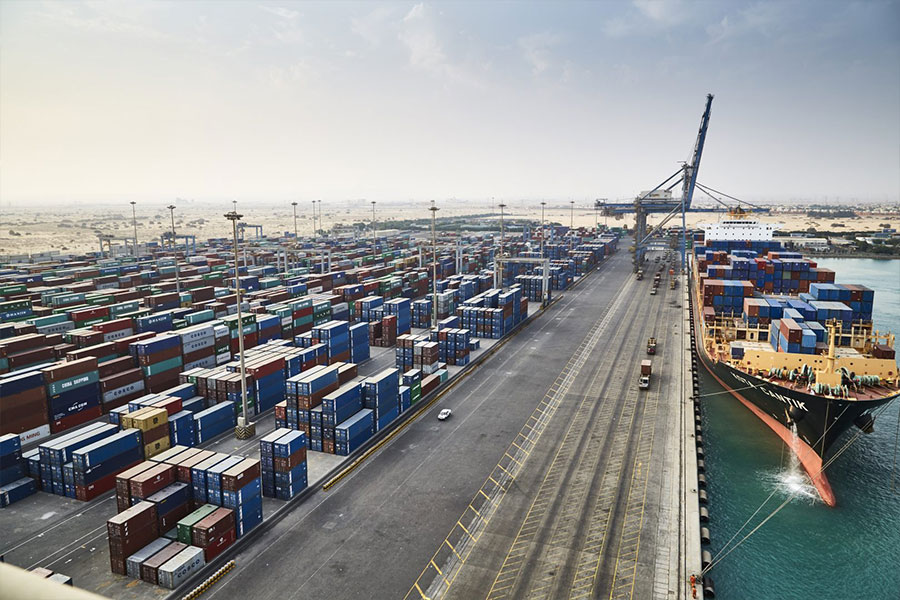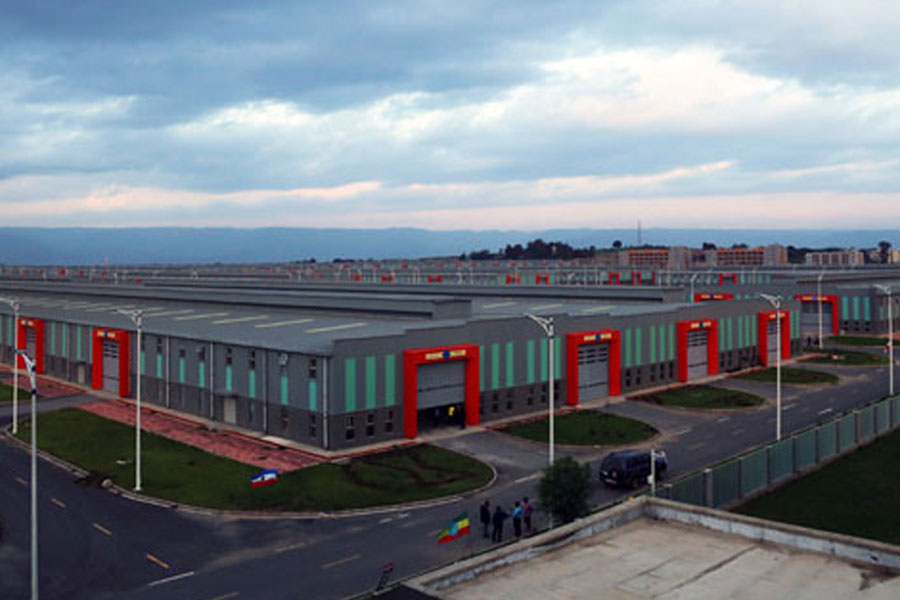
Verbatim | May 24,2025
The Ethiopian Customs Commission has implemented a sweeping change in how import duties are calculated, rattling businesses across sectors. The shift, effective from July 29, 2024, comes as the National Bank of Ethiopia (NBE) transitioned the Birr to a market-based exchange rate system, a reform sought to address the overvaluation of the currency and curbing rampant illicit trading and foreign currency shortages that have plagued the economy.
Under the new system, import duties are calculated based on the NBE's indicative daily exchange rates, which reflect the weighted average rates of all commercial banks. This marks a departure from the previous practice of using a fixed exchange rate for duty calculations, a change that has introduced volatility and unpredictability into the import process. On August 9, 2024, the NBE posted an indicative exchange rate of 104.46 Br to the dollar, a major jump from the rates seen weeks earlier.
Martha Hailemariam, an advisor to the vice governor of NBE, said the indicative price is intended to help agencies like the Customs Commission determine their rates. According to her, in the first week, prices were inflated to match the parallel market, leading to a foreign currency auction to stabilise the market. She believes the changes will ultimately bring financial stability. Within a week of the forex market liberalisation, the Birr experienced a sharp depreciation, plummeting from around 58.6 Br for a dollar to over 100 Br. The commercial banks have been intermittently adjusting their rates, leaving importers and manufacturers uncertain.
The Ethiopian Customs Commission, under Debele Kabeta, issued a directive requiring all customs branches to adjust declaration rates to the current exchange rate, even for goods registered before the currency liberalisation. It also mandated the re-collection of taxes on imported goods previously assessed at the old rates. His decision is seen as part of a broader effort to conform with the government's fiscal policies with the new market-based exchange rate system.
Last fiscal year, the Commission collected nearly 200 billion Br in taxes, likely to rise under the new system.
The reform has had immediate consequences for importers, who are now facing higher costs. Businesses that had opened Letters of Credit (LCs) before the change were particularly hard hit, as they were forced to pay duties calculated at the new, higher rates, regardless of the exchange rate in effect when the LCs were issued. This has led to widespread disruption, with companies scrambling to cover the unexpected additional costs.
Kassaye Ayele, the tariff administration director at the Commission, defended the decision, arguing that it aligns with the broader economic reforms underway.
"Tariffs are calculated based on the daily rate when imports are declared, not on the rate when LCs were opened by importers," he told Fortune. "It's only fair."
However, the impact of the change has been immediate and severe on importers.
Yeshadam Trading Plc, a company that imports chemicals and laboratory equipment for major firms like Dashen Brewery and Holland Dairy, faced sharp cost increases. After opening an LC worth 42,000 dollars, the company was hit with an additional one million Birr in expenses, bringing the total cost to 3.7 million Br, with duties inflated by 30pc.
"I didn't see it coming," said Ashenif Adamu, the company's major shareholder and general manager.
The situation was further compounded by a doubling of air freight costs, forcing Yesha-Adam Trading to pay over 600,000 Br for over a ton of cargo. In response, the company has decided to raise its prices by an average of 40pc, which Ashenif hopes customers will understand, though he acknowledges the strain it will place on the business.
"It's more than what we could handle," he said.
However, the authorities are unhappy with importers who are determined to transfer additional costs to the market. The Ministry of Trade & Regional Integration (MoTRI) convened a meeting last week, where officials mandated that businesses refrain from increasing prices and instead absorb the additional costs. While the Minister, Kassahun Gofe, expressed optimism about the long-term prospects of the liberalisation, many in the business community struggle to understand the logic behind the directive.
For Temesgen Haileselassie, a shareholder and general manager of FineBaz Plc., an importer of laboratory equipment and chemicals, there is no logic behind the authorities' order. His company, which supplies 90pc of its materials to publicly owned universities and research institutions, faced a financial shock when a portion of its 460,000 dollar LC shipment arrived days after the changes were made. The consignment fee doubled to 6.7 million Br, resulting in a loss of over 2.3 million Br, with tax dues increasing by 600,000 Br to 1.4 million Br.
"I was in complete shock," he said.
The timing of the currency liberalisation has placed Fine Baz in a particularly difficult position, as it has already entered into binding contract agreements with its customers before ordering the supplies, preventing it from passing on the additional costs.
"We'll supply the materials at a huge loss," Temesgen said, expressing frustration over the situation.
The authorities have intensified their crackdown on traders suspected of raising prices in the domestic market, reflecting the government's concern over the potential for runaway inflation. Sewnet Abate, communications director at the Addis Abeba Trade Bureau, acknowledged the barriers preventing price hikes, particularly for essential commodities.
"Traders are inevitably raising prices, making it hard to control," he told Fortune.
Experts warn that the increased customs duties and the government's directive against price hikes could place unsustainable pressure on businesses. Ketema Adane, a tax expert and partner at Ethio-Alliance Advocates LLP, pointed out that while the customs rate adjustment is an internationally recognised method of calculation, the burden on importers is substantial.
"Importers will feel a huge burden," he said.
Ketema also criticised the authorities' response to price hikes, warning that prohibiting businesses from passing on the additional costs could lead to bankruptcy for some.
"It is a no-brainer that they should be allowed to pass the price down," he said.
However, importers are caught in the crossfire, facing a rapidly changing environment that threatens to upend their businesses.
Despite these, the Ethiopian Investment Commission recently announced that the country attracted 3.8 billion dollars in foreign direct investment (FDI) in the past fiscal year, an 11.5pc increase compared to the previous year. However, the business environment remains apprehensive; the recent customs changes have added another layer of complexity.
The European Chamber, representing 180 companies operating in Ethiopia, has expressed concerns about the impact of the changes on its members. Bahiru Temesgen, the chamber's executive director, noted that while some members are optimistic about the long-term benefits of the forex reforms, others are worried about the immediate operational problems they face.
"Some importers have been voicing concerns," he said.
One of those affected is Puratos Ethiopia, a subsidiary of Belgium's Puratos Group, a global company with operations in 84 countries and annual net sales of 3.1 billion euros. After the Birr was floated, the company's first shipment was met with an additional 1.5 million Br in taxes.
"It's been a huge burden for us," said Zeco Kassim, general manager of Puratos Ethiopia.
Zeco anticipates that all Puratos' orders over the past and a half months will face additional costs of up to 200 million Br. The company has decided to suspend further imports until the situation stabilises.
"It'll be difficult to continue like this," Zeco said. "The tax burden needs to be waived."
PUBLISHED ON
Aug 11,2024 [ VOL
25 , NO
1267]

Verbatim | May 24,2025

Fortune News | Aug 21,2023

Exclusive Interviews | Jan 07,2023

Sunday with Eden | Jun 07,2025

Featured | Jan 07,2024

Fortune News | May 17,2025

Fortune News | Sep 27,2025

Editorial | Aug 12,2023

Exclusive Interviews | May 17,2025

Fortune News | May 08,2021

Dec 22 , 2024 . By TIZITA SHEWAFERAW
Charged with transforming colossal state-owned enterprises into modern and competitiv...

Aug 18 , 2024 . By AKSAH ITALO
Although predictable Yonas Zerihun's job in the ride-hailing service is not immune to...

Jul 28 , 2024 . By TIZITA SHEWAFERAW
Unhabitual, perhaps too many, Samuel Gebreyohannes, 38, used to occasionally enjoy a couple of beers at breakfast. However, he recently swit...

Jul 13 , 2024 . By AKSAH ITALO
Investors who rely on tractors, trucks, and field vehicles for commuting, transporting commodities, and f...

Oct 18 , 2025
The political establishment, notably the ruling party and its top brass, has become p...

Oct 11 , 2025
Ladislas Farago, a roving Associated Press (AP) correspondent, arrived in Ethiopia in...

Oct 4 , 2025
Eyob Tekalegn (PhD) had been in the Governor's chair for only weeks when, on Septembe...

Sep 27 , 2025
Four years into an experiment with “shock therapy” in education, the national moo...